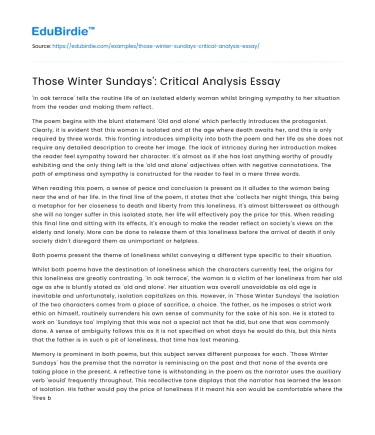'In oak terrace' tells the routine life of an isolated elderly woman whilst bringing sympathy to her situation from the reader and making them reflect.
The poem begins with the blunt statement 'Old and alone' which perfectly introduces the protagonist. Clearly, it is evident that this woman is isolated and at the age where death awaits her, and this is only required by three words. This fronting introduces simplicity into both the poem and her life as she does not require any detailed description to create her image. The lack of intricacy during her introduction makes the reader feel sympathy toward her character. It's almost as if she has lost anything worthy of proudly exhibiting and the only thing left is the 'old and alone' adjectives often with negative connotations. The path of emptiness and sympathy is constructed for the reader to feel in a mere three words.
Save your time!
We can take care of your essay
- Proper editing and formatting
- Free revision, title page, and bibliography
- Flexible prices and money-back guarantee
When reading this poem, a sense of peace and conclusion is present as it alludes to the woman being near the end of her life. In the final line of the poem, it states that she 'collects her night things, this being a metaphor for her closeness to death and liberty from this loneliness. It's almost bittersweet as although she will no longer suffer in this isolated state, her life will effectively pay the price for this. When reading this final line and sitting with its effects, it's enough to make the reader reflect on society's views on the elderly and lonely. More can be done to release them of this loneliness before the arrival of death if only society didn't disregard them as unimportant or helpless.
Both poems present the theme of loneliness whilst conveying a different type specific to their situation.
Whilst both poems have the destination of loneliness which the characters currently feel, the origins for this loneliness are greatly contrasting. 'In oak terrace', the woman is a victim of her loneliness from her old age as she is bluntly stated as 'old and alone'. Her situation was overall unavoidable as old age is inevitable and unfortunately, isolation capitalizes on this. However, in 'Those Winter Sundays' the isolation of the two characters comes from a place of sacrifice, a choice. The father, as he imposes a strict work ethic on himself, routinely surrenders his own sense of community for the sake of his son. He is stated to work on 'Sundays too' implying that this was not a special act that he did, but one that was commonly done. A sense of ambiguity follows this as it is not specified on what days he would do this, but this hints that the father is in such a pit of loneliness, that time has lost meaning.
Memory is prominent in both poems, but this subject serves different purposes for each. 'Those Winter Sundays' has the premise that the narrator is reminiscing on the past and that none of the events are taking place in the present. A reflective tone is withstanding in the poem as the narrator uses the auxiliary verb 'would' frequently throughout. This recollective tone displays that the narrator has learned the lesson of isolation. His father would pay the price of loneliness if it meant his son would be comfortable where the 'fires blaze' instead of the 'blue-black cold'. Through this involuntary lonely existence, he learned to appreciate the things his father did for him, even if he didn't at the time. 'In oak terrace' uses memories as an explanation for the character's loneliness. They come unwelcomed and uncontrollable as enjambement between stanzas two and three is used to introduce them and shows that they overpower her current world as only a stanza before viewing the 'local births and deaths' was being referenced as an activity. She, and others around her, have suffered 'poverty, sickness, abandonment' and most prominently a brother's brain melting to madness'. The vivid imagery and alliteration of the final suffering emphasize its importance and impact on her as it is ingrained so well into her psyche. 'Melting to madness' as well reflects the idea that her sense of community has disintegrated as she lives this solitary life.
Both poems use the literary device of enjambment between lines and stanzas to reflect the theme of loneliness. Enjambment is used between the second and third stanza within 'In oak terrace' to introduce her memories which are the cause of her isolation, and 'Those Winter Sundays', in stanzas one and three, use enjambment to show the distance the father has placed himself away from his son. The end of the lines are bare compared to the ones embellished with commas or full stops which accentuates how much of a lone figure both the son and father are.
Unlike 'In oak terrace', 'Those Winter Sundays' uses fire and warmth to symbolize love and a sense of connection between the two, slightly combatting the loneliness present throughout. The father would get up early to combat the cold by making the 'fires blaze', and the rooms 'warm' until he had 'driven out the cold' just so that the son can feel comfort when he awakes. Although he doesn't have time to physically show it, he clearly has a love for his son. A connection between the two, even though it is only brought about by one, is present through this heat and warmth felt by the two. Loneliness is still prominent in their relationship, but the warmth is able to bring them ever so slightly closer together.






 Stuck on your essay?
Stuck on your essay?

